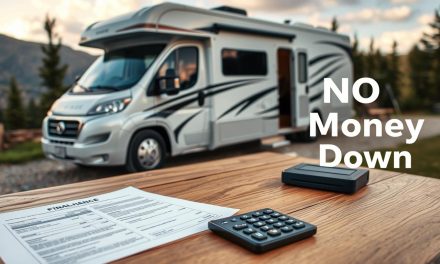Owning an RV offers freedom and flexibility, but it also raises questions when tax season arrives. You might wonder if the interest on your RV loan can lower your taxable income.
Yes, in many cases, you can deduct RV loan interest if your RV qualifies as a home with sleeping, cooking, and bathroom facilities.
Recent tax law changes, such as the One Big Beautiful Bill Act of 2025, made this deduction even more accessible by allowing certain RV owners to claim interest as an above-the-line deduction. That means you may not need to itemize to benefit.
Understanding how your RV fits into these rules can help you make the most of your tax situation. Knowing what qualifies, how to document it, and when it applies can save you money and stress.
Whether you use your RV as a home, a vacation getaway, or even for business travel, the right approach can turn your loan interest into a valuable deduction.
Key Takeaways
- RV loan interest may qualify as a deductible expense if the RV meets home requirements
- New tax rules make some RV interest deductions available without itemizing
- Proper documentation helps maximize and protect your tax benefits
Can RV Interest Be Deducted?
You may be able to deduct interest paid on an RV loan if the vehicle meets certain IRS definitions and loan conditions. The deduction depends on how the RV is used, how the loan is secured, and whether it qualifies as a “home” under federal tax law.
IRS Rules for Deducting RV Loan Interest
The IRS lets you deduct interest on a qualified home loan under the home mortgage interest deduction. This rule applies to your main home and one second home.
If your RV is used as either, and the loan is secured by it, you can usually include the interest as deductible mortgage interest.
The One Big Beautiful Bill Act of 2025 (OBBBA) also introduced a new above-the-line deduction for interest on loans used to buy qualifying recreational vehicles. This means you don’t have to itemize deductions to claim it.
However, you must use the RV for personal, not business, purposes to qualify under this rule. Business use falls under separate tax treatment, such as Schedule C or depreciation deductions.
| Type of Deduction | Itemizing Required | Applies To |
|---|---|---|
| Home Mortgage Interest | Yes | Main or second home |
| OBBBA RV Interest Deduction | No | Qualifying RVs purchased 2025–2028 |
Would you like to save this article?
Qualified Home Requirements for RVs
To qualify as a home for interest deduction, your RV must have sleeping, cooking, and toilet facilities. The IRS uses these three features to define a dwelling unit.
If your RV lacks any of them, it doesn’t count as a home, and you can’t deduct the loan interest as mortgage interest.
The loan must also be secured by the RV, meaning the lender has a lien on it similar to a mortgage. Unsecured personal loans used to buy an RV don’t qualify.
You can only treat one RV as a second home each year. If you own multiple RVs, you must choose which one to designate for deduction purposes.
Limits on Deductible RV Loan Interest
The Tax Cuts and Jobs Act (TCJA) set limits on total mortgage debt eligible for interest deduction. You can deduct interest on up to $750,000 of combined home and second-home loans if married filing jointly ($375,000 if single).
If your RV loan pushes your total secured debt above that amount, only the portion within the limit qualifies.
The OBBBA deduction allows up to $10,000 per year in RV loan interest from 2025 through 2028. This deduction applies separately from the mortgage interest deduction and can lower taxable income even if you take the standard deduction.
Keep detailed loan and interest statements to support your claim if the IRS requests documentation.
RV as a Primary or Secondary Residence
You can deduct interest on an RV loan if the vehicle qualifies as a home under IRS rules. The RV must have sleeping, cooking, and toilet facilities, and you must use it as either your main home or a secondary home for personal use.
Defining Primary Residence for RV Owners
If you live in your RV most of the year, you may treat it as your primary residence. The IRS allows a home mortgage interest deduction when the loan is secured by the RV and the RV is your main home.
Your RV must include permanent facilities for sleeping, cooking, and sanitation. These features make it a self-contained living space that meets the IRS definition of a home.
You can use your RV address for official documents, such as tax filings or driver’s license registration, to help establish it as your primary home. Keeping records of where you stay most often supports your claim if questioned.
If you move frequently, the home you use for the majority of the year—where you receive mail and keep personal belongings—generally counts as your primary residence.
RV as a Second Home: Eligibility and Use Requirements
When you use your RV for vacations or part-time living, it may qualify as a second home. The IRS allows you to deduct interest on one main home and one second home if both loans are secured by the properties.
To qualify, your RV must have the same basic living facilities as a house. You must also use it for personal purposes for more than 14 days per year or 10% of the days it’s rented out, whichever is greater.
If you meet these conditions, you can include the RV loan interest as part of your mortgage interest deduction. However, the total deductible loan amount is limited—typically up to $750,000 for joint filers or $375,000 for single filers.
You should keep documentation showing personal use days, rental agreements, and loan details to support your deduction claim.
Personal vs. Rental Use Considerations
Your ability to deduct RV loan interest depends on how you use the RV. Personal use supports the deduction, while rental use can limit or remove eligibility.
If you rent out your RV for much of the year, you must track the number of personal and rental days. The IRS uses these figures to determine whether the RV qualifies as a second home.
A simple way to track this is with a use log that lists dates and purpose of each trip. If personal use falls below the required threshold, the RV may be treated as rental property, and the interest becomes a business expense rather than a home mortgage interest deduction.
Keeping clear records ensures you apply the correct tax treatment and avoid disallowed deductions.
RV Tax Deductions Beyond Interest
You may qualify for other RV tax deductions besides loan interest. These include tax benefits related to sales taxes and property taxes, which can reduce your overall costs of owning an RV if you meet certain IRS requirements.
Sales Tax Deduction When Purchasing an RV
When you buy a new or used RV, you may deduct state and local sales taxes paid at purchase. This deduction applies if you choose to deduct sales tax instead of state income tax on your federal return.
You can claim this deduction whether the RV is your main home, second home, or recreational vehicle. The IRS allows you to use either the actual sales tax paid or an optional sales tax table based on your income and state rate.
If your state charges a high sales tax or you made a large purchase, itemizing deductions may provide more savings than taking the standard deduction. Keep receipts and purchase documents showing the sales tax amount.
| Deduction Option | When It Applies | Key Record to Keep |
|---|---|---|
| Actual sales tax paid | For large RV purchases | Purchase invoice |
| Optional sales tax table | For typical purchases | IRS table reference |
State and Local Property Tax Deductions
If your state or county charges a personal property tax on your RV, you can deduct that amount on your federal return if you itemize. The tax must be based on the RV’s assessed value and charged annually.
Many states treat RVs like motor vehicles for property tax purposes. You can usually find the amount on your registration renewal notice or tax bill.
Only the portion based on value—not flat registration fees—qualifies for deduction. To claim this deduction, report the tax as a state and local personal property tax on Schedule A.
Keeping clear records of payments and assessment values helps support your claim if the IRS requests verification.
Business and Rental Use of RVs
When you use an RV for business, the IRS allows certain deductions if you meet specific requirements. You can often deduct expenses tied to business travel, depreciation, and loan interest, but only for the portion used for work.
Accurate records and clear separation between business and personal use are essential.
Business Use Deduction for RVs
If you use your RV for business more than 50% of the time, you may qualify for business-use deductions. This includes costs such as fuel, maintenance, insurance, and campground fees incurred while conducting business travel.
You must keep detailed logs showing mileage, destinations, and business purposes. The IRS requires this documentation to verify that the RV is used primarily for legitimate business activities.
When an RV doubles as a mobile office, you can deduct a percentage of expenses equal to your verified business-use percentage. For example:
| Business Use % | Deductible Portion of Expenses |
|---|---|
| 100% | Full deduction |
| 75% | 75% of eligible expenses |
| 50% | 50% of eligible expenses |
If you rent your RV to others through a platform or business, report the income and related expenses on Schedule C or Schedule E, depending on your setup.
Home Office Deduction in an RV
You can claim a home office deduction if part of your RV is used exclusively and regularly for business. The space must be a defined area, such as a desk or workstation, that serves no personal purpose.
This deduction applies only if you are self-employed. Employees cannot claim it under current tax law.
The deduction covers a portion of utilities, internet, and depreciation based on the space’s percentage of the RV’s total area. Because RVs have limited space, qualifying can be difficult.
Even a small amount of personal use in the same area can disqualify the deduction. Keeping photos and layout notes helps support your claim.
Depreciation and Other Business-Related Deductions
If your RV qualifies as a business asset, you may deduct depreciation over several years. Under Section 179, you can expense part or all of the RV’s cost in the year it’s placed in service, as long as business use exceeds 50%.
You may also qualify for bonus depreciation, though the percentage allowed decreases each year after 2023. These deductions reduce taxable income by accounting for the RV’s wear and tear.
Other deductible costs may include:
- Insurance premiums related to business coverage
- Registration fees and property taxes tied to business use
- Interest on an RV loan if the RV serves as collateral and is used for business
You must adjust all deductions based on your verified business-use percentage to stay compliant with IRS rules.
Itemizing vs. Standard Deduction for RV Owners
Your choice between itemizing deductions and taking the standard deduction affects whether you can benefit from deducting RV loan interest. The right option depends on your total deductible expenses, filing status, and how much interest you pay on your RV loan.
When to Itemize Deductions
You should consider itemizing when your total deductible expenses exceed the standard deduction for your filing status. Common itemized deductions include:
- Mortgage or RV loan interest
- State and local taxes (SALT)
- Charitable contributions
- Medical expenses exceeding income limits
If you use your RV as a qualified home—with sleeping, cooking, and bathroom facilities—you can include the loan interest as a home mortgage interest deduction.
Itemizing may also make sense if you have high state taxes or large charitable donations. However, itemizing requires more recordkeeping and documentation.
You must keep receipts, loan statements, and tax records to support your deductions. If your total itemized deductions are lower than the standard deduction, you will likely save more by claiming the standard deduction instead.
Comparing Itemized and Standard Deduction Benefits
The standard deduction simplifies filing by giving you a fixed deduction amount. For 2025, the IRS sets these amounts by filing status.
You can use this table for reference:
| Filing Status | Standard Deduction (2025 est.) |
|---|---|
| Single | $14,600 |
| Married Filing Jointly | $29,200 |
| Head of Household | $21,900 |
If your RV loan interest and other deductions total less than these amounts, itemizing won’t reduce your taxable income further.
The One Big Beautiful Bill Act of 2025 introduced an above-the-line deduction for up to $10,000 in RV loan interest. This means you can deduct that interest even if you take the standard deduction, removing the need to itemize just for RV interest.
You should compare both methods to see which gives you the lowest taxable income. Simple math or tax software can help you calculate which option provides the greater benefit.
Maximizing and Documenting Your RV Tax Benefits
You can strengthen your RV tax benefits by keeping complete records, seeking professional advice, and avoiding common filing errors.
Record-Keeping and Documentation Requirements
Keep organized records to support any RV-related deductions. Save loan documents, interest statements (Form 1098), and purchase contracts showing that the RV qualifies as a recreational or tow vehicle under current tax law.
Maintain receipts for major repairs, upgrades, and maintenance if they connect to business or qualified travel use. Store digital copies in a secure folder and back them up regularly.
Create a simple log showing when and how you use your RV. Include mileage, destinations, and whether trips were personal, business, or mixed.
This helps you separate deductible expenses from non-deductible ones. A sample record table can help:
| Record Type | Example Document | Retention Period |
|---|---|---|
| Loan Interest | Form 1098 | 3 years |
| Purchase Proof | Bill of Sale | 3 years |
| Usage Log | Travel Journal | 3 years |
Consulting a Tax Professional
A qualified tax professional can help you apply the One Big Beautiful Bill Act of 2025 (OBBBA) rules correctly. This law allows an above-the-line deduction for interest paid on qualifying RV and tow vehicle loans, even if you don’t itemize.
Tax experts can verify whether your RV meets the IRS definition of a dwelling, which requires sleeping, cooking, and bathroom facilities. They can also identify if you qualify for both the standard RV interest deduction and other related credits.
When choosing a professional, ask about their experience with vehicle-related deductions and travel expense reporting. Bring your records and past returns to your appointment to speed up the review process.
Common Mistakes to Avoid
Many RV owners lose deductions by misclassifying their vehicle or failing to track use correctly. If your RV doesn’t meet the dwelling criteria, you can’t claim it under the home mortgage interest rules.
Avoid deducting personal travel interest or non-qualified loan interest. Only interest on loans used to buy or improve a qualifying RV or tow vehicle counts.
Don’t rely on estimates for usage or loan amounts. The IRS requires accurate figures supported by documentation.
Keep your records current and review them before filing to prevent errors that could trigger an audit.







